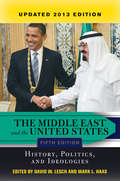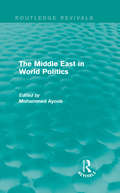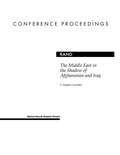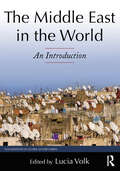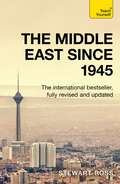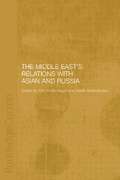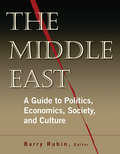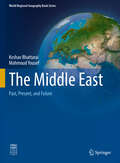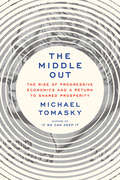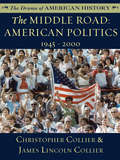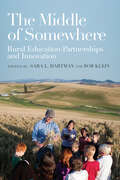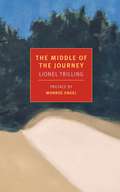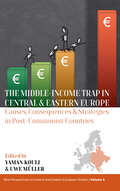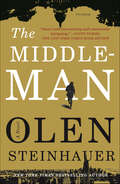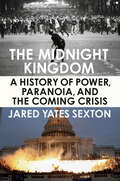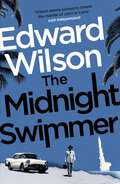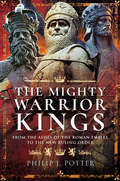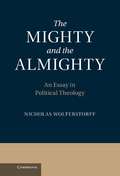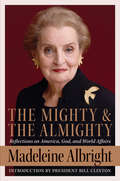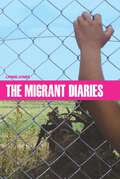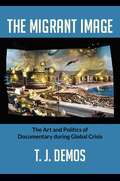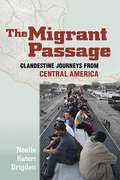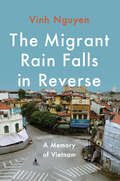- Table View
- List View
The Middle East and the United States: History, Politics, and Ideologies, UPDATED 2013 EDITION
by David W. LeschThe 2013 updated fifth edition of the acclaimed The Middle East and the United States brings together scholars and diplomats from the Middle East, Europe, and North America to provide an objective, cross-cultural assessment of US policy toward the Middle East. Regional experts David W. Lesch and Mark L. Haas include a new chapter dedicated to the events of the Arab Spring and its aftermath, looking with a special eye to the impact on US interactions with the region. The text also features five new chapters discussing the superpowers and the Middle East throughout the Cold War; the Bush and Obama administrations and the Arab-Israeli conflict; contemporary US-Syrian relations; the importance of ideology to US-Iranian relations under the last three administrations; and US relations with al-Qa'ida. Carefully edited and reorganized to place a greater emphasis on current events, The Middle East and the United States provides comprehensive and authoritative coverage of US foreign policy and Middle East political history from the first World War through the Arab Spring and beyond.
The Middle East in International Relations Power, Politics and Ideology
by Fred HallidayThe international relations of the Middle East have long been dominated by uncertainty and conflict. External intervention, interstate war, political upheaval and interethnic violence are compounded by the vagaries of oil prices and the claims of military nationalist and religious movements. Fred Halliday sets this region and its conflicts in context, providing on the one hand, a historical introduction to its character and problems, and, on the other, a reasoned analysis of its politics. In an engagement with both the study of the Middle East and the theoretical analysis of international relations, Halliday, one of the best known and most respected scholars writing on the region today, offers a compelling and original interpretation. Written in a clear, accessible and interactive style, the book is designed for students, policymakers, and the general reader. Fred Halliday is Professor of International Relations at the London School of Economics. He is the author and editor of several publications including Two Hours that Shook the World: September 11, 2001: Causes and Consequences (Tauris, 2002), Islam & the Myth of Confrontation (Tauris, 2002), The World at 2000: Perils and Promises (Macmillan, 2001), and Nation and Religion in the Middle East (Lynne Rienner, 2000).
The Middle East in World Politics (Routledge Revivals)
by Mohammed AyoobThe Middle East is, and has always been, of major global economic and political importance. First published in 1981, this edited collection analyses many of the crucial issues that have had international repercussions during the second half of the twentieth century, with each paper considering the particular regional problems within the widest possible political framework. Internationally renowned authors consider such areas as the relationship between Israel and the Middle East, the influence of oil on global decision-making, Afghanistan and its neighbours, and the economic issues that the region has faced. A timely and relevant reissue, dealing with problems of continued importance, this volume will be of particular interest to students researching the history of the Middle Eastern conflict and the region’s variety of relationships with the West.
The Middle East in the Shadow of Afghanistan and Iraq
by F. Stephen LarrabeeOn May 5-6, 2003, RAND and the Geneva Centre for Security Policy held a two-day conference in Geneva that examined the impact of the Iraq war on the security of the Middle EastThis document summarizes the main issues and points of discussion at the conference.
The Middle East in the World: An Introduction (Foundations in Global Studies)
by Lucia VolkThe Middle East in the World offers students a fresh, comprehensive, multidisciplinary entry point to the broader Middle East. After a brief introduction to the study of the region, the early chapters of the book survey the essentials of Middle Eastern history; important historical narratives; and the region's languages, religions, and global connections. Students are guided through the material with relevant maps, resource boxes, and text boxes that support and guide further independent exploration of the topics at hand.The second half of the book presents interdisciplinary case studies, each of which focuses on a specific country or sub-region and a salient issue, offering a taste of the cultural distinctiveness of the particular country while also drawing attention to global linkages. Readers will come away from this book with an understanding of the larger historical, political, and cultural frameworks that shaped the Middle East as we know it today, and of current issues that have relevance in the Middle East and beyond.
The Middle East since 1945 (TY History)
by Stewart RossThis much needed new edition provides a complete and essential guide to this fast developing, ever changing and often tense region. This book, fully updated for 2024, examines the origins and development of the events which have dominated the headlines for the last seven decades. Covering everything from religion and politics in the aftermath of the Second World War to the Israeli-Palestinian conflict, terrorism, war in Iraq and Syria and the extraordinary economic growth of the Gulf states, it will change the way you think about the region and provide balance and clarity.
The Middle East since 1945 (TY History)
by Stewart RossThis much needed new edition provides a complete and essential guide to this fast developing, ever changing and often tense region. This book, fully updated for 2024, examines the origins and development of the events which have dominated the headlines for the last seven decades. Covering everything from religion and politics in the aftermath of the Second World War to the Israeli-Palestinian conflict, terrorism, war in Iraq and Syria and the extraordinary economic growth of the Gulf states, it will change the way you think about the region and provide balance and clarity.
The Middle East's Relations with Asia and Russia (Durham Modern Middle East and Islamic World Series #Vol. 5)
by Anoushiravan Ehteshami Hannah CarterCarter and Ehteshami consider the significant geopolitical, economic and security links between the Middle East and the wider Asian world - links which are often overlooked when the Middle East is considered in isolation or in terms of its relations with the West, but which are of growing importance. Topics covered include Asia's overall geostrategic realities and the Middle East's place within them; relations between the Middle East and China, Russia, central Asia, southeast Asia and south Asia; Islam in central Asia and southeast Asia and the connections with the Middle East; and the important links between the Middle East and India and Pakistan's military and security establishments.
The Middle East: A Guide to Politics, Economics, Society and Culture (Critical Concepts In Political Science Ser.)
by Barry RubinThe Middle East is an area of great importance globally, yet misperceptions abound. Events have made it a region of special interest to the West and so the search for understanding gains momentum. This publication is intended to clarify the region’s complex history and issues. In developing this project, the contributors’ set out to explore seven significant themes that are usually not found in other sources. While many books focus on political history and conflicts, this two-volume work deals specifically with culture, religion, women, economics, governance, and media, as well as the role that the region’s modern history has played in shaping its society and worldview.
The Middle East: Past, Present, and Future (World Regional Geography Book Series)
by Keshav Bhattarai Mahmoud YousefThe Middle East and North Africa (MENA) region stands as a remarkable crossroads of tradition and modernity, shaped by millennia of history under empires, colonial powers, and global influences. This book unpacks the intricate dynamics of the region, examining how historical resource exploitation, border manipulation, and cultural impositions have profoundly impacted its languages, traditions, and geopolitical identity. The rich tapestry of Arabic, Farsi, Kurdish, and regional dialects reflects a deep cultural resilience that has resisted globalization, often fueled anti-Western sentiments and prioritized the preservation of heritage over rapid economic development. Central to the region’s geopolitical importance is its vast oil wealth, which has positioned MENA as a cornerstone of the global energy market and a continuous focus of Western interest. This book explores how oil exploitation has economically empowered the region while simultaneously fostering political tension, external interventions, and instability. As the global shift toward green technologies accelerates, the book examines how this transition might redefine MENA’s role in the global energy market, offering both challenges and opportunities for transformation. These dynamics unfold against the backdrop of water scarcity and a scorching, inhospitable climate that further complicates the region’s path forward. Grounded in real-life case studies and an interdisciplinary blend of historical, cultural, and economic analysis, this book offers an unparalleled exploration of the MENA region’s past, present, and future in the context of advanced technological development. Co-authored by a Palestinian native, it brings a unique perspective by dissecting ongoing identity crises through unbiased insights and true-life conversations with individuals who have embraced diverse religious and political ideologies. By intertwining these narratives with the region’s deeply rooted cultural practices, the book presents a compelling human lens to understand MENA's complexities. This rare and thought-provoking study seamlessly balances traditional and modern perspectives, emphasizing the MENA region’s pivotal role at the intersection of Western powers and the Global South. For readers seeking to grasp the intricate dynamics of a region that continues to influence and adapt to an ever-changing global order, this book serves as an indispensable resource.
The Middle Out: The Rise of Progressive Economics and a Return to Shared Prosperity
by Michael TomaskyPolitical journalist Michael Tomasky tracks an exciting change among progressive economists who are overturning decades of conservative dogma and offering an alternative version of capitalism that can serve broadly shared prosperity to all.In the first half of the twentieth century the Keynesian brand of economics, which saw government spending as a necessary spur to economic growth, prevailed. Then in the 1970s, conservatives fought back. Once they got people to believe a few simple ideas instead—that only the free market could produce growth, that taxes and regulation stifle growth—the battle was won. The era of conservative dogma, often called neoliberal economics, had begun. It ushered in increasing inequality, a shrinking middle class, and declining public investment. For fifty years, liberals have not been able to make a dent in it. Until now. In The Middle Out, journalist Michael Tomasky narrates this history and reports on the work of today's progressive economists, who are using mountains of historical evidence to contradict neoliberal claims. Their research reveals conservative dogma to be unfounded and shows how concentrated wealth has been built on the exploitation of women, minorities, and the politically powerless. Middle-out economics, in contrast, is the belief that prosperity comes from a thriving middle class, and therefore government plays a role in supporting families and communities. This version of capitalism--more just, more equal, and in which prosperity is shared--could be the American future.
The Middle Road: 1945 - 2000
by James Lincoln Collier Christopher CollierHistory is dramatic -- and the renowned, award-winning authors Christopher Collier and James Lincoln Collier demonstrate this in a compelling series aimed at young readers. Covering American history from the founding of Jamestown through present day, these volumes explore far beyond the dates and events of a historical chronicle to present a moving illumination of the ideas, opinions, attitudes and tribulations that led to the birth of this great nation. The Middle Road: American Politics discusses the politics in the United States from 1945 through 2000. The authors examine the effects of McCarthyism, the assassinations of John F. Kennedy and Martin Luther King, Jr., the Watergate scandal, and the presidencies of Reagan, George H.W. Bush, and Bill Clinton. The text is enhanced with maps, photographs, political cartoons, and other historically significant images.
The Middle of Somewhere: Rural Education Partnerships and Innovation
by Sara L. Hartman and Bob KleinHighlights innovative partnership practices that help create educational opportunities for students in rural schools across the United States.As editors Sara L. Hartman and Bob Klein acknowledge, rural places have long experienced systemic inequities that decrease rural students' access to education, yet many rural schools and communities have found creative means to make up for the dearth of outside resources. The Middle of Somewhere brings to light a wide variety of partnerships that have been forged between K–12 schools, communities, and postsecondary institutions to improve educational access. The book showcases collaborations that address three different areas of need: partnerships that prepare and support teacher candidates and educators who work in rural areas; partnerships that extend the work of rural education networks; and partnerships that promote equity, justice, and inclusion within rural populations. Using case studies of rural educational partnerships from communities across the United States, the book's contributors share their experiences of how strong partnerships have formed both organically and through thoughtful and intentional planning, and they recommend supportive strategies for their development and sustainment. The contributors also explore the many ways in which university–school–community partnerships incubate solutions to challenges common to rural education systems, such as access to STEM education and higher education. The programs featured here may serve as replicable models for practitioners, researchers, and policy makers who want to enrich the experiences of children in their schools and communities.
The Middle of the Journey
by Monroe Engel Lionel TrillingPublished in 1947, as the cold war was heating up, Lionel Trilling's only novel was a prophetic reckoning with the bitter ideological disputes that were to come to a head in the McCarthy era. The Middle of the Journey revolves around a political turncoat and the anger his action awakens among a group of intellectuals summering in Connecticut. The story, however, is less concerned with the rights and wrongs of left and right than with an absence of integrity at the very heart of the debate. Certainly the hero, John Laskell, staging a slow recovery from the death of his lover and a near-fatal illness of his own, comes to suspect that the conflicts and commitments involved are little more than a distraction from the real responsibilities, and terrors, of the common world. A detailed, sometimes slyly humorous, picture of the manners and mores of the intelligentsia, as well as a work of surprising tenderness and ultimately tragic import, The Middle of the Journey is a novel of ideas whose quiet resonance has only grown with time. This is a deeply troubling examination of America by one of its greatest critics.
The Middle-Income Trap in Central and Eastern Europe: Causes, Consequences and Strategies in Post-Communist Countries (New Perspectives on Central and Eastern European Studies #4)
by Yaman Kouli and Uwe MüllerSince the 1990s, the economic development of Central and Eastern Europe has maintained high economic growth rates, seemingly leading to an era of prosperity. This very positive vision of future economic success, linked to current political backlash and a long history of economic adversity, is a thin veil of the economic “way west” for so-called transition countries. The Middle-Income Trap in Central and Eastern Europe examines the reality of the diminishing marginal utility of further international investments alongside the pitfalls of higher government spending to cultivate innovation which ultimately makes foreign capital less attractive. In this volume authors from diverse disciplinary perspectives reflect on current debates surrounding the developmental bottlenecks in East-Central Europe. Their common goal is to analyze the manner of socio-economic transformation, question of the relevance and impact of the “middle-income trap” and identify possible ways to escape it.
The Middleman: A Novel
by Olen SteinhauerOne of the Boston Globe’s Best Mysteries of the Year: “A thought-provoking political thriller, a dark story for dark times” from the bestselling author (Washington Post).With The Middleman, Olen Steinhauer, the New York Times–bestselling author of All the Old Knives, delivers a compelling portrait of a nation on the edge of revolution, and the deepest motives of the men and women on the opposite sides of the divide.One day in the early summer of 2017, about four hundred people disappear from their lives. They leave behind cell phones, credit cards, jobs, houses, families—everything—all on the same day. Where have they gone? Why? The only answer, for weeks, is silence.Kevin Moore is one of them. Former military, disaffected, restless, Kevin leaves behind his retail job in San Francisco, sends a good-bye text to his mother, dumps his phone and wallet into a trash can, and disappears.The movement calls itself the Massive Brigade, and they believe change isn’t coming fast enough to America. But are they a protest organization, a political movement, or a terrorist group? What do they want? The FBI isn’t taking any chances. Special Agent Rachel Proulx has been following the growth of left-wing political groups in the US since the fall of 2016, and is very familiar with Martin Bishop, the charismatic leader of the Massive Brigade. But she needs her colleagues to take her seriously in order to find these people before they put their plan—whatever it is—into action.What Rachel uncovers will shock the entire nation, and the aftermath of her investigation will reverberate through the FBI to the highest levels of government.
The Midnight Kingdom: A History of Power, Paranoia, and the Coming Crisis
by Jared Yates SextonFrom the author of American Rule and the host of The Muckrake Podcast, an ambitious account of how white supremacist lies, religious mythologies, and poisonous conspiracy theories built the modern world and threaten to plunge us into an authoritarian nightmare. To fully understand these strange and dangerous times, Jared Yates Sexton takes a hard look at our nation&’s history: namely, the abuses committed by those in power and the comforting stories that shaped the way the West has viewed itself up to the present. As reactionaries and authoritarians cling to myths about &“Western civilization,&” The Midnight Kingdom exposes how political power, religious indoctrination, and economic dominance have been repeatedly weaponized to oppress and exploit, sounding an alarm for what lies ahead as the current order frays. Beginning with the Roman Empire and racing through centuries of colonization, war, genocide, and the recurring clashes of progress and regression, Sexton finds our modern world at a crossroads. In an echo of past crises, we have arrived at a time of historic inequality and a fading trust in our institutions. Meanwhile, authoritarianism is gaining momentum and the progress of the twentieth century is being rolled back at dizzying speed. This catastrophic moment holds terrible potential for a return to a totalitarian past or, potentially, a better, realer, more human future. The difference depends on a true reckoning with our history and the larger forces at play or hiding behind this disastrous fantasy of Western superiority. Bracing and compulsively readable, The Midnight Kingdom takes a critical look at the forces that have shaped human civilization for centuries—and invites us to seek a radically different future.
The Midnight Swimmer (William Catesby)
by Edward WilsonOctober, 1962. If the Cuban gamble goes wrong and war breaks out, Britain will no longer exist. London dispatches a secret envoy to defuse the confrontation. Spawned in the bleak poverty of an East Anglian fishing port, Catesby is a spy with a big anti-establishment chip on his shoulder. He loves his country, but despises the class who run it. Loathed by the Americans and trusted by the Russians, Catesby is sent to Havana and Washington to make clandestine contacts. London has authorised Catesby to offer Moscow a secret deal to break the Cuban Missile Crisis deadlock. But before that can happen, Catesby meets the Midnight Swimmer who has a chilling message for Washington. A triangle of love and death that began in Berlin ends in Cuba. On one corner is a war disabled KGB general, on another corner is his unfulfilled wife... This sophisticated novel is full of twists and turns that merge historical fact with fiction. Sleaze and high politics literally share the same beds. A white-knuckle superpower standoff is played out against a backdrop of honey trap blackmail, Mafia contracts, assassinations and Vatican scandal. The real blurs into the surreal as Che's car surfs on the Havana seafront and Fidel takes the pitcher's mound against a professional baseball team.
The Mighty Warrior Kings: From the Ashes of the Roman Empire to the New Ruling Order
by Philip J. PotterThe epic victories and struggles of nine kings—from the restoration of the western Roman empire by Charlemagne to the battles of Robert the Bruce.The Mighty Warrior Kings traces the history of early Europe through the biographies of nine kings, who had the courage, determination and martial might to establish their dominance over the fragmented remnants of the Roman Empire. The book begins with Charlemagne, who united large regions of current-day France, Germany and Italy into the Holy Roman Empire and ends with Robert the Bruce, who gallantry defended Scotland against the attempted usurpation of England. There are many famous warrior kings in the book, including Alfred the Great of Wessex, whose victories over the Vikings led to the unification of England under a single ruler, William I of Normandy, whose triumph at Hastings in 1066 changed the course of English history, while Frederick I Barbarossa led his army to victory in Germany and Italy solidifying and expanding the lands under the suzerainty of the Holy Roman Emperor. Among the lesser known monarchs discussed in the work are Cnut, whose victory at the battle of Ashingdon won the English crown and resulted in the creation of the North Sea Empire, which ruled over the kingdoms of England, Denmark and Norway, while during the reign of Louis IX of France the knights of Europe answered his call for the Seven Crusade to expel the Muslims from the Holy City of Jerusalem. From Charlemagne to Robert the Bruce, the warrior kings created a new Europe with a centralized power base and set the stage for the following Age of Absolutism.“A most fascinating account.” —Firetrench
The Mighty and the Almighty
by Nicholas WolterstorffFor a century or more political theology has been in decline. Recent years, however, have seen increasing interest not only in how church and state should be related, but in the relation between divine authority and political authority, and in what religion has to say about the limits of state authority and the grounds of political obedience. In this book, Nicholas Wolterstorff addresses this whole complex of issues. He takes account of traditional answers to these questions, but on every point stakes out new positions. Wolterstorff offers a fresh theological defense of liberal democracy, argues that the traditional doctrine of 'two rules' should be rejected and offers a fresh exegesis of Romans 13; the canonical biblical passage for the tradition of Christian political theology. This book provides useful discussion for scholars and students of political theology, law and religion, philosophy of religion and social ethics.
The Mighty and the Almighty: Reflections on America, God, and World Affairs
by Madeleine AlbrightDoes America, as George W. Bush has proclaimed, have a special mission, derived from God, to bring liberty and democracy to the world? How much influence does the Christian right have over U.S. foreign policy? And how should America deal with violent Islamist extremists? <P><P> Madeleine Albright, the former secretary of state and bestselling author of Madam Secretary, offers a thoughtful and often surprising look at the role of religion in shaping America's approach to the world. Drawing upon her experiences while in office and her own deepest beliefs about morality, the United States, and the present state of world affairs, a woman noted for plain speaking offers her thoughts about the most controversial topics of our time.
The Migrant Diaries (International Humanitarian Affairs)
by Lynne JonesWhat is it like to run away from bombing, lose your family, and work out how to take care of yourself in a foreign country when you are seven years old? What do you do when the woman who promised you a good job in Europe turns out to have sold you into prostitution? How do you escape from torture and detention in Libya? What is it like to almost drown in the Mediterranean and then be confined in a garbage and rat-filled settlement on a Greek island for years?In this book, Lynne Jones answers these questions by combining direct testimony from children with a blazingly frank eyewitness account of providing mental health support on the front line of the migrant crisis across Europe and Central America in the past five years. Her diaries document how a compassionate welcome shifted to indifference and hostility toward those seeking refuge from war, disaster, and poverty in the richest countries in the world. They shine light on what it is like to be caught up on the front lines of the migrant crises in Europe and Central America, either as a person in flight or as a volunteer trying to help. They show how people who have fled war, poverty, and disaster—trapped in degrading, humiliating living conditions—have responded with resourcefulness and creativity. In the absence of most large professional humanitarian agencies, migrants and volunteers together have created a new form of humanitarianism that challenges old ways of working.Today there are 79 million forcibly displaced people in the world today, 1 percent of the world’s population. Understanding the perspectives of people on the move has never been more important.The Author's profits from this book will be donated to the charity: CHOOSE LOVE/HELP REFUGEES
The Migrant Image: The Art and Politics of Documentary during Global Crisis
by T. J. DemosIn The Migrant Image T. J. Demos examines the ways contemporary artists have reinvented documentary practices in their representations of mobile lives: refugees, migrants, the stateless, and the politically dispossessed. He presents a sophisticated analysis of how artists from the United States, Europe, North Africa, and the Middle East depict the often ignored effects of globalization and the ways their works connect viewers to the lived experiences of political and economic crisis. Demos investigates the cinematic approaches Steve McQueen, the Otolith Group, and Hito Steyerl employ to blur the real and imaginary in their films confronting geopolitical conflicts between North and South. He analyzes how Emily Jacir and Ahlam Shibli use blurs, lacuna, and blind spots in their photographs, performances, and conceptual strategies to directly address the dire circumstances of dislocated Palestinian people. He discusses the disparate interventions of Walid Raad in Lebanon, Ursula Biemann in North Africa, and Ayreen Anastas and Rene Gabri in the United States, and traces how their works offer images of conflict as much as a conflict of images. Throughout Demos shows the ways these artists creatively propose new possibilities for a politics of equality, social justice, and historical consciousness from within the aesthetic domain.
The Migrant Passage: Clandestine Journeys from Central America
by Noelle Kateri BrigdenAt the crossroads between international relations and anthropology, The Migrant Passage analyzes how people from El Salvador, Honduras, and Guatemala navigate the dangerous and uncertain clandestine journey across Mexico to the United States. However much advance planning they do, they survive the journey through improvisation. Central American migrants improvise upon social roles and physical objects, leveraging them for new purposes along the way. Over time, the accumulation of individual journeys has cut a path across the socioeconomic and political landscape of Mexico, generating a social and material infrastructure that guides future passages and complicates borders.Tracing the survival strategies of migrants during the journey to the North, The Migrant Passage shows how their mobility reshapes the social landscape of Mexico, and the book explores the implications for the future of sovereignty and the nation-state. To trace the continuous renewal of the transit corridor, Noelle Brigden draws upon over two years of in-depth, multi-sited ethnographic fieldwork along human smuggling routes from Central America across Mexico and into the United States. In so doing, she shows the value of disciplinary and methodological border crossing between international relations and anthropology, to understand the relationships between human security, international borders, and clandestine transnationalism.
The Migrant Rain Falls in Reverse: A Memory of Vietnam
by Vinh NguyenAn unconventional memoir of conjuring the uncertain past and a long-lost homeland, and a vital document of one family&’s journey through world historyWith the fall of Saigon on April 30, 1975, the U.S. war in Vietnam ended, but the refugee crisis was only beginning. Among the millions of people who fled Vietnam by boat were Vinh Nguyen, along with his mother and siblings, and his father, who left separately and then mysteriously vanished.Decades later, Nguyen goes looking for the story of his father. What he discovers is a sea of questions drifting above sunken truths. To come to terms with the past, Nguyen must piece together the debris of history with family stories that have been scattered across generations and continents, kept for decades in broken hearts and guarded silences.The Migrant Rain Falls in Reverse takes readers on a poignant tour of disappeared refugee camps, abandoned family homes, and the lives that could have been. As the fiftieth anniversary of the end of the Vietnam War approaches, this powerful memoir is timelier and more important than ever, illuminating the stories, real and imagined, that become buried in the rubble of war.
